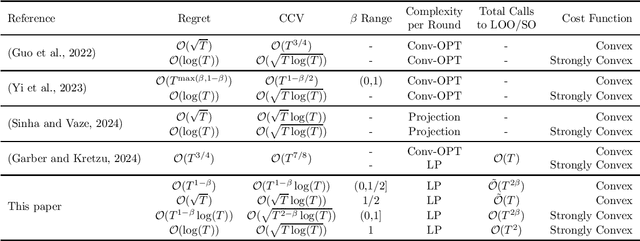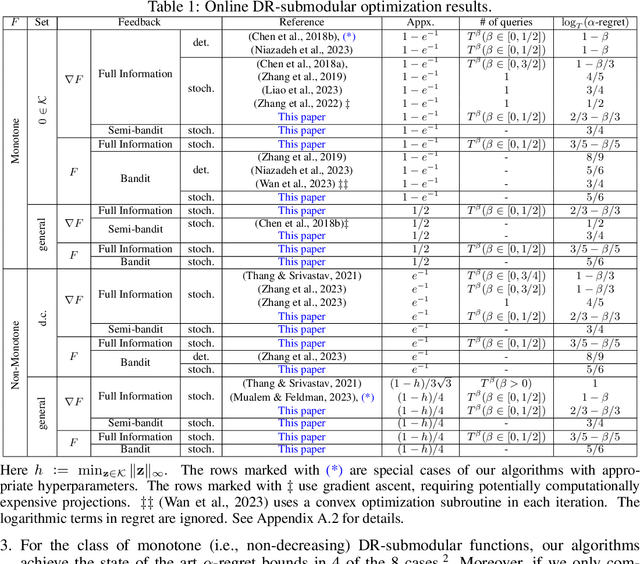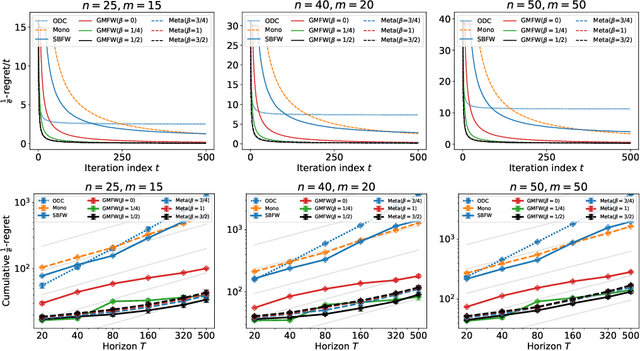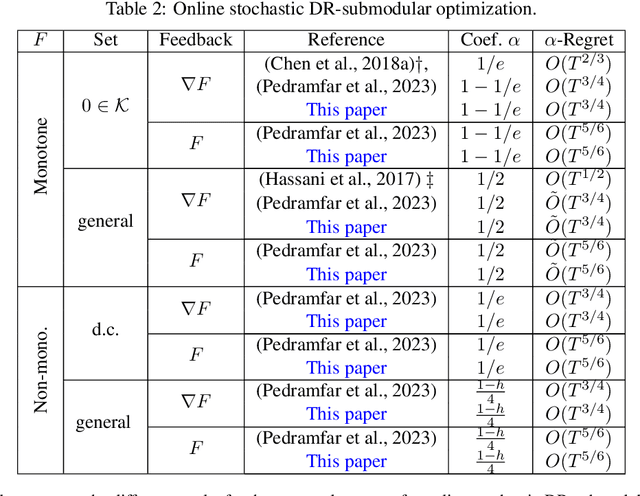Mohammad Pedramfar
Diffusion Tree Sampling: Scalable inference-time alignment of diffusion models
Jun 25, 2025Abstract:Adapting a pretrained diffusion model to new objectives at inference time remains an open problem in generative modeling. Existing steering methods suffer from inaccurate value estimation, especially at high noise levels, which biases guidance. Moreover, information from past runs is not reused to improve sample quality, resulting in inefficient use of compute. Inspired by the success of Monte Carlo Tree Search, we address these limitations by casting inference-time alignment as a search problem that reuses past computations. We introduce a tree-based approach that samples from the reward-aligned target density by propagating terminal rewards back through the diffusion chain and iteratively refining value estimates with each additional generation. Our proposed method, Diffusion Tree Sampling (DTS), produces asymptotically exact samples from the target distribution in the limit of infinite rollouts, and its greedy variant, Diffusion Tree Search (DTS$^\star$), performs a global search for high reward samples. On MNIST and CIFAR-10 class-conditional generation, DTS matches the FID of the best-performing baseline with up to $10\times$ less compute. In text-to-image generation and language completion tasks, DTS$^\star$ effectively searches for high reward samples that match best-of-N with up to $5\times$ less compute. By reusing information from previous generations, we get an anytime algorithm that turns additional compute into steadily better samples, providing a scalable approach for inference-time alignment of diffusion models.
Order-Optimal Projection-Free Algorithm for Adversarially Constrained Online Convex Optimization
Feb 23, 2025
Abstract:Projection-based algorithms for constrained Online Convex Optimization (COCO) face scalability challenges in high-dimensional settings due to the computational complexity of projecting iterates onto constraint sets. This paper introduces a projection-free algorithm for COCO that achieves state-of-the-art performance guarantees while eliminating the need for projections. By integrating a separation oracle with adaptive Online Gradient Descent (OGD) and employing a Lyapunov-driven surrogate function, while dynamically adjusting step sizes using gradient norms, our method jointly optimizes the regret and cumulative constraint violation (CCV). We also use a blocked version of OGD that helps achieve tradeoffs betweeen the regret and CCV with the number of calls to the separation oracle. For convex cost functions, our algorithm attains an optimal regret of $\mathcal{O}(\sqrt{T})$ and a CCV of $\mathcal{O}(\sqrt{T} \log T)$, matching the best-known projection-based results, while only using $\tilde{\mathcal{O}}({T})$ calls to the separation oracle. The results also demonstrate a tradeoff where lower calls to the separation oracle increase the regret and the CCV. In the strongly convex setting, we further achieve a regret of $\mathcal{O}(\log T)$ and a CCV of $\mathcal{O}(\sqrt{T\log T} )$, while requiring ${\mathcal{O}}({T}^2)$ calls to the separation oracle. Further, tradeoff with the decreasing oracle calls is studied. These results close the gap between projection-free and projection-based approaches, demonstrating that projection-free methods can achieve performance comparable to projection-based counterparts.
Decentralized Projection-free Online Upper-Linearizable Optimization with Applications to DR-Submodular Optimization
Jan 30, 2025Abstract:We introduce a novel framework for decentralized projection-free optimization, extending projection-free methods to a broader class of upper-linearizable functions. Our approach leverages decentralized optimization techniques with the flexibility of upper-linearizable function frameworks, effectively generalizing traditional DR-submodular function optimization. We obtain the regret of $O(T^{1-\theta/2})$ with communication complexity of $O(T^{\theta})$ and number of linear optimization oracle calls of $O(T^{2\theta})$ for decentralized upper-linearizable function optimization, for any $0\le \theta \le 1$. This approach allows for the first results for monotone up-concave optimization with general convex constraints and non-monotone up-concave optimization with general convex constraints. Further, the above results for first order feedback are extended to zeroth order, semi-bandit, and bandit feedback.
From Linear to Linearizable Optimization: A Novel Framework with Applications to Stationary and Non-stationary DR-submodular Optimization
Apr 27, 2024Abstract:This paper introduces the notion of upper linearizable/quadratizable functions, a class that extends concavity and DR-submodularity in various settings, including monotone and non-monotone cases over different convex sets. A general meta-algorithm is devised to convert algorithms for linear/quadratic maximization into ones that optimize upper quadratizable functions, offering a unified approach to tackling concave and DR-submodular optimization problems. The paper extends these results to multiple feedback settings, facilitating conversions between semi-bandit/first-order feedback and bandit/zeroth-order feedback, as well as between first/zeroth-order feedback and semi-bandit/bandit feedback. Leveraging this framework, new projection-free algorithms are derived using Follow The Perturbed Leader (FTPL) and other algorithms as base algorithms for linear/convex optimization, improving upon state-of-the-art results in various cases. Dynamic and adaptive regret guarantees are obtained for DR-submodular maximization, marking the first algorithms to achieve such guarantees in these settings. Notably, the paper achieves these advancements with fewer assumptions compared to existing state-of-the-art results, underscoring its broad applicability and theoretical contributions to non-convex optimization.
Unified Projection-Free Algorithms for Adversarial DR-Submodular Optimization
Mar 15, 2024



Abstract:This paper introduces unified projection-free Frank-Wolfe type algorithms for adversarial continuous DR-submodular optimization, spanning scenarios such as full information and (semi-)bandit feedback, monotone and non-monotone functions, different constraints, and types of stochastic queries. For every problem considered in the non-monotone setting, the proposed algorithms are either the first with proven sub-linear $\alpha$-regret bounds or have better $\alpha$-regret bounds than the state of the art, where $\alpha$ is a corresponding approximation bound in the offline setting. In the monotone setting, the proposed approach gives state-of-the-art sub-linear $\alpha$-regret bounds among projection-free algorithms in 7 of the 8 considered cases while matching the result of the remaining case. Additionally, this paper addresses semi-bandit and bandit feedback for adversarial DR-submodular optimization, advancing the understanding of this optimization area.
A Generalized Approach to Online Convex Optimization
Feb 13, 2024
Abstract:In this paper, we analyze the problem of online convex optimization in different settings. We show that any algorithm for online linear optimization with fully adaptive adversaries is an algorithm for online convex optimization. We also show that any such algorithm that requires full-information feedback may be transformed to an algorithm with semi-bandit feedback with comparable regret bound. We further show that algorithms that are designed for fully adaptive adversaries using deterministic semi-bandit feedback can obtain similar bounds using only stochastic semi-bandit feedback when facing oblivious adversaries. We use this to describe general meta-algorithms to convert first order algorithms to zeroth order algorithms with comparable regret bounds. Our framework allows us to analyze online optimization in various settings, such full-information feedback, bandit feedback, stochastic regret, adversarial regret and various forms of non-stationary regret. Using our analysis, we provide the first efficient projection-free online convex optimization algorithm using linear optimization oracles.
Improved Bayesian Regret Bounds for Thompson Sampling in Reinforcement Learning
Oct 30, 2023Abstract:In this paper, we prove the first Bayesian regret bounds for Thompson Sampling in reinforcement learning in a multitude of settings. We simplify the learning problem using a discrete set of surrogate environments, and present a refined analysis of the information ratio using posterior consistency. This leads to an upper bound of order $\widetilde{O}(H\sqrt{d_{l_1}T})$ in the time inhomogeneous reinforcement learning problem where $H$ is the episode length and $d_{l_1}$ is the Kolmogorov $l_1-$dimension of the space of environments. We then find concrete bounds of $d_{l_1}$ in a variety of settings, such as tabular, linear and finite mixtures, and discuss how how our results are either the first of their kind or improve the state-of-the-art.
A Unified Approach for Maximizing Continuous DR-submodular Functions
May 26, 2023Abstract:This paper presents a unified approach for maximizing continuous DR-submodular functions that encompasses a range of settings and oracle access types. Our approach includes a Frank-Wolfe type offline algorithm for both monotone and non-monotone functions, with different restrictions on the general convex set. We consider settings where the oracle provides access to either the gradient of the function or only the function value, and where the oracle access is either deterministic or stochastic. We determine the number of required oracle accesses in all cases. Our approach gives new/improved results for nine out of the sixteen considered cases, avoids computationally expensive projections in two cases, with the proposed framework matching performance of state-of-the-art approaches in the remaining five cases. Notably, our approach for the stochastic function value-based oracle enables the first regret bounds with bandit feedback for stochastic DR-submodular functions.
Stochastic Submodular Bandits with Delayed Composite Anonymous Bandit Feedback
Mar 23, 2023
Abstract:This paper investigates the problem of combinatorial multiarmed bandits with stochastic submodular (in expectation) rewards and full-bandit delayed feedback, where the delayed feedback is assumed to be composite and anonymous. In other words, the delayed feedback is composed of components of rewards from past actions, with unknown division among the sub-components. Three models of delayed feedback: bounded adversarial, stochastic independent, and stochastic conditionally independent are studied, and regret bounds are derived for each of the delay models. Ignoring the problem dependent parameters, we show that regret bound for all the delay models is $\tilde{O}(T^{2/3} + T^{1/3} \nu)$ for time horizon $T$, where $\nu$ is a delay parameter defined differently in the three cases, thus demonstrating an additive term in regret with delay in all the three delay models. The considered algorithm is demonstrated to outperform other full-bandit approaches with delayed composite anonymous feedback.
 Add to Chrome
Add to Chrome Add to Firefox
Add to Firefox Add to Edge
Add to Edge